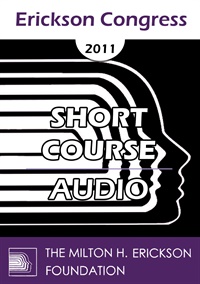
- Average Rating:
- Not yet rated
- Topic Areas:
- Short Courses | Art and Creativity | Experiential Therapy | Hypnosis | Therapist Development
- Categories:
- Erickson Congress | Erickson Congress 2011
- Faculty:
- Diane Holliman, PhD | Halim Faisal, MSW
- Duration:
- 1:23:14
- Format:
- Audio Only
- Original Program Date:
- Dec 09, 2011
- Short Description:
- In continuing education (CE), knowledge and skills are most often taught didactically. Participants of continuing education come to workshops ready for the CE trance. In this short course, we will demonstrate how we did something different! We integrated hypnotic techniques such as suggestion and dissociation, along with performance, improvisation, music, philosophy and psychotherapy to elicit experiential learning with emotional impact in a series of workshops for Georgia NASW.
- Price:
- $15.00 - Base Price
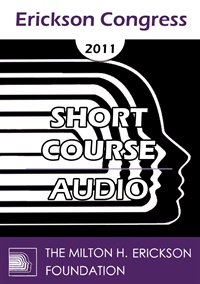
- Average Rating:
- Not yet rated
- Topic Areas:
- Short Courses | Art and Creativity | Brief Therapy | Consciousness | Unconscious Processes | Hypnosis | Resistance | Music
- Categories:
- Erickson Congress | Erickson Congress 2011
- Faculty:
- Alan Redstone, MA
- Duration:
- 1:25:54
- Format:
- Audio Only
- Original Program Date:
- Dec 09, 2011
- Short Description:
- Music is an effective Brief Therapy tool that can be used to instantly access right brain intelligence, elicit conscious and unconscious material for processing, and induce hypnotic states that render listeners receptive to positive suggestions of wellness, relaxation, and integration. A single short song can cut through resistance, setting the perfect atmosphere for a highly productive session.
- Price:
- $15.00 - Base Price
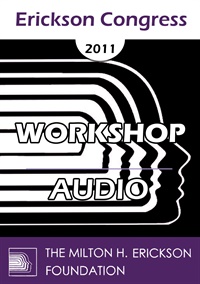
- Average Rating:
- Not yet rated
- Topic Areas:
- Hypnotherapy | Trance | Workshops | Art and Creativity | Ericksonian Hypnosis and Therapy Techniques | Music | Seeding | Mind-Body | Resistance
- Categories:
- Erickson Congress | Erickson Congress 2011
- Faculty:
- Anita Jung, M.S.
- Duration:
- 59 Minutes
- Format:
- Audio Only
- Original Program Date:
- Dec 07, 2011
- Short Description:
- Music within a hypnotherapy model functions as a catalyst accentuating the nuances of seeding, guiding associations, and deepening trance states. Participants will experience and practice how to musically transform mood states, utilize music creatively and effectively within a hypnotherapy session, and explore the latest research on the melody-mind-body link.
- Price:
- $20.00 - Base Price
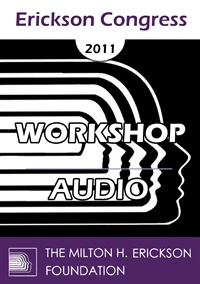
- Average Rating:
- Not yet rated
- Topic Areas:
- Workshops | Obsessive Compulsive Disorder (OCD) | Art and Creativity | Therapist Development
- Categories:
- Erickson Congress | Erickson Congress 2011
- Faculty:
- Reid Wilson, PhD
- Duration:
- 59 Minutes
- Format:
- Audio Only
- Original Program Date:
- Dec 07, 2011
- Short Description:
- Persuading OCD clients to adopt a new frame of reference is the therapist's primary task. Altering perception--not adding technique--helps them change directions, because belief always trumps exposure practice. Participants will learn a persuasive strategy--built out of whole cloth within the first session--that will frame the entire treatment protocol.
- Price:
- $20.00 - Base Price
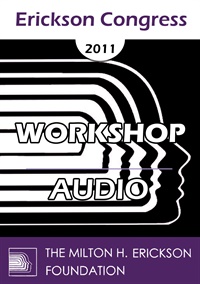
- Average Rating:
- Not yet rated
- Topic Areas:
- Trauma | StoryPlay | Workshops | Children and Adolescent Therapy | Metaphors | Storytelling | Art and Creativity
- Categories:
- Erickson Congress | Erickson Congress 2011
- Faculty:
- Joyce Mills, PhD, LMFT
- Duration:
- 59 Minutes
- Format:
- Audio Only
- Original Program Date:
- Dec 07, 2011
- Short Description:
- With the neuro-healing power of metaphor, creativity and play at its center, this experiential training presents StoryPlay® ; an Ericksonian, resiliency-based, indirective process that interweaves cultural diversity and natural healing abilities, to effect transformational change for children and adolescents who have experienced trauma and adversity.
- Price:
- $20.00 - Base Price
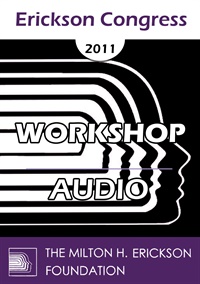
- Average Rating:
- Not yet rated
- Topic Areas:
- Workshops | Resistance | Art and Creativity | Ericksonian Hypnosis and Therapy Techniques | Music
- Categories:
- Erickson Congress | Erickson Congress 2011
- Faculty:
- Bruce Gregory, PhD
- Duration:
- 59 Minutes
- Format:
- Audio Only
- Original Program Date:
- Dec 07, 2011
- Short Description:
- This workshop will explore the expanding role of creativity in the treatment of resistance. It will integrate Erickson’s resistance protocol with principles from physics and classical music composition theory. Five major components of Erickson’s protocol: validation, the experience of failure, motivation, the conscious/unconscious polarity, and the experience of uncertainties with respect to the lessening of the patient’s defenses will be integrated with the concepts of mass, momentum, motion, position, time, creative repetition and harmony.
- Price:
- $20.00 - Base Price
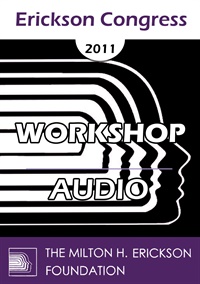
IC11 Workshop 45 - Zen in the Art and Science of Psychotherapy - Annellen & Alexander Simpkins, PhDs
- Average Rating:
- Not yet rated
- Topic Areas:
- Psychotherapy | Workshops | Art and Creativity | Mindfulness | Neuroscience | Meditation, Spirituality and Yoga
- Categories:
- Erickson Congress | Erickson Congress 2011
- Faculty:
- Alexander Simpkins, PhD | Annellen M. Simpkins, PhD
- Duration:
- 59 Minutes
- Format:
- Audio Only
- Original Program Date:
- Dec 07, 2011
- Short Description:
- Zen is a venerable tradition, illuminating inner nature. Neuroscience corroborates that Zen enhances mind and brain in extraordinary ways, helpful for therapy, and this workshop describes new findings. Participants are guided into the Zen experience—open and aware. They will enhance their hypnotherapeutic sensitivities and learn Zen methods for working with clients.
- Price:
- $20.00 - Base Price

- Average Rating:
- Not yet rated
- Topic Areas:
- Hypnosis | Workshops | Anger | Art and Creativity | Ericksonian Hypnosis and Therapy Techniques | Music
- Categories:
- Erickson Congress | Erickson Congress 2011
- Faculty:
- Albina Tamalonis, PsyD
- Duration:
- 59 Minutes
- Format:
- Audio Only
- Original Program Date:
- Dec 07, 2011
- Short Description:
- Ericksonian hypnotic techniques, potentiated by music, can help the angry patient learn a nonreactive relationship to their anger. The science of music physiology and research that supports the efficacy of recording your hypnosis will be presented. The legal and “fair use” of music on CD’s will be explained. Listening to hypnosis with music will allow attendees to experience this calming effect for themselves.
- Price:
- $20.00 - Base Price
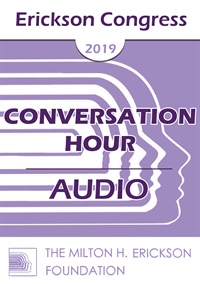
- Average Rating:
- Not yet rated
- Topic Areas:
- Conversation Hours | Art and Creativity | Communication | Humor
- Categories:
- Erickson Congress | Erickson Congress 2019
- Faculty:
- Michael Hoyt, PhD
- Duration:
- 1 Hour 3 Minutes
- Format:
- Audio Only
- Original Program Date:
- Dec 14, 2019
- Short Description:
- For many, Erickson set the prototypical example of how to be creative and often evoked a You Said What?! (YSW?!) reaction from clients and students. As we describe in the new book, Creative Therapy in Challenging Situations: Unusual Interventions to Help Clients (Hoyt & Bobele, 2019), such YSW?! interventions are particularly useful and effective when approaching unusual client problems.
- Price:
- $15.00 - Base Price
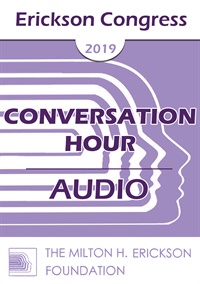
- Average Rating:
- Not yet rated
- Topic Areas:
- Conversation Hours | Art and Creativity | Hypnosis
- Categories:
- Erickson Congress | Erickson Congress 2019
- Faculty:
- Carol Kershaw, EdD | Bill Wade, PhD
- Duration:
- 59 Minutes
- Format:
- Audio Only
- Original Program Date:
- Dec 14, 2019
- Short Description:
- Explore the latest research in optimal functioning, creativity, and flow and how to help clients achieve this state more frequently.
- Price:
- $15.00 - Base Price
Tags: Art and Creativity Hypnosis
Please wait ...

